Cloud Mountain Continues Innovating in 40th Year
Written by: Laura Hauer
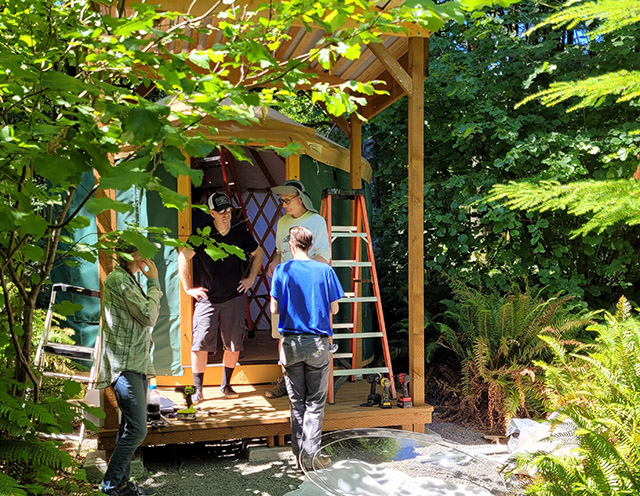
A team builds one of the new yurts, which have created 10 new single rooms for Cloud Mountain.
Photos by Laura Hauer
The Northwest’s Cloud Mountain Retreat Center is celebrating its 40th anniversary in 2024, as it evolves with new approaches and new technologies, to better serve retreatants and teachers from around the world.
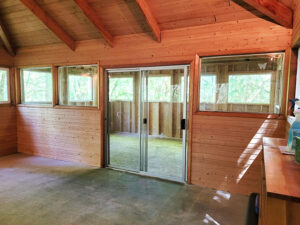
Over the last three years the retreat center has been adapting to the accelerating challenges of climate change, with nearly the entire facility receiving upgrades and renovations. Among the upgrades are energy-efficient heating and cooling technologies to better respond to the new hot and cold temperature extremes of our region. Ductless heat exchangers, which use refrigeration-related technology, have been installed in most of the buildings and all of Cloud Mountain’s 10 new yurts. With these Cloud Mountain will keep retreatants comfortable during extreme weather.
Putting up the new yurts now allows Cloud Mountain to offer every retreatant a single sleeping space. Lessons from the Covid pandemic clarified that this was vital to move away from multiple-person rooms toward single-occupancy rooms, to support public health in a serious, conscious way. The main meditation hall was also expanded, by removing two retreatant rooms formerly at the back of Diamond Hall, to provide more room to enhance health and wellbeing.
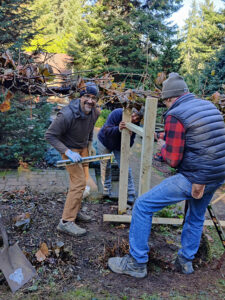
A key evolution in response to future uncertainties is fostering a spirit of volunteerism and a network of volunteers. Cloud Mountain’s annual retreat schedule is now speckled with “dana hands” volunteer weekends, and occasional single-day volunteer events. Deepening community and collective stewardship of the retreat center, is an investment in skillfully meeting whatever the future brings.
From its beginnings, Cloud Mountain’s evolution has responded to the needs of the wider Northwest sangha in forming its retreat offerings, and has depended on this community for its very purpose. Broadening active volunteer support builds in resilience for continuing to serve the dharma, if social or economic shifts impact the center’s staffing or financial realities.
What will the next 40 (or more) years hold? Cloud Mountain hopes to continue its current form as much as possible: offering a retreat environment that combines simplicity, integrity, kindness and direct contact with the natural world, to support spiritual deepening and realization. The center wishes to offer highly affordable retreats that support inclusivity, and that are led by realized and deeply ethical teachers.
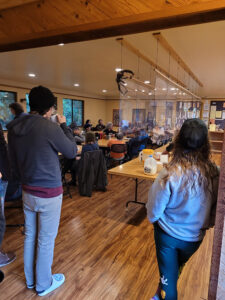
While these are deeply held aspirations, covid taught many lessons about impermanence, resolution and adaptability. The broad destabilizations – environmental, economic, social and political – taking place due to climate change, will only intensify over time. Retreat center leaders will retain our values, but will sometimes have to reprioritize.
This journey was started 40 years ago by Dhammadasa David Branscomb and his then-wife Anna Delacroix. Branscomb, a journeyman carpenter, had built a tiny, rustic house out in the forests of southwest Washington.
They were both interested in meditation and invited some of their local friends to come out occasionally to practice together. The little house in the Castle Rock woods was temporarily transformed into a practice center for these events, where everyone came together in silence to meditate, cook, eat and sleep over weekends.
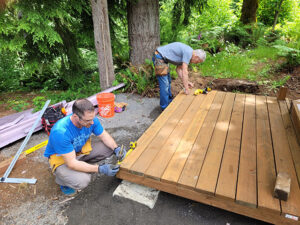
Through a series of coincidences, a Seattle Zen practice group led by teacher Glenn Webb, heard about this little house deep in the woods. This Zen group’s Seattle neighbors didn’t appreciate the noise and parking congestion that accompanied their in-city sesshins, so the Zen group asked about doing their retreats at the house in Castle Rock.
The Branscombs generously offered out their home to support this 1984 first retreat, and this became the historic launch of Cloud Mountain Retreat Center.
In 1984 there was little in-person dharma available. You would have been hard-pressed to find a teacher or an organized dharma group in the Northwest, or through much of the United States, for that matter. Webb’s Seattle Zen sangha was then unusual, as one of a very few organized Buddhist practice groups in the Northwest.
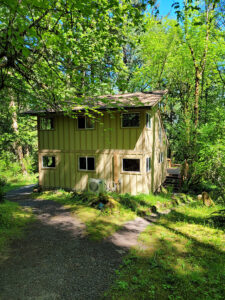
As a result of this relative lack of opportunity, many people turned to the limited number of dharma books then available, to learn about Buddhist practice. They also kept their ears open for ways to connect with other like-minded people and to practice meditation. This interest in and curiosity about Buddhist meditation began to feed the organic evolution of Cloud Mountain as a forest retreat center, which offered opportunities to engage in extended, teacher-guided meditation practice.
For quite some time Cloud Mountain was the lone Northwest venue for people to gather and practice meditation together. Although not a community itself, Cloud Mountain’s meditation retreats fostered the growth of ecumenical Buddhist communities in Seattle, Portland and throughout the Northwest. Many spiritual friendships and sanghas formed from these in-person contacts, providing momentum for growing communities practicing in the Theravada, Mahayana and Vajrayana lineages.

Cloud Mountain invited teachers who went on to form some well-known regional dharma organizations and centers. These included Shodo Harada Roshi, founder of One Drop Zendo on Whidbey Island; Robert Beatty, founder of Portland Insight Meditation Community; Ven. Thubten Chodron, founder of Sravasti Abbey; Lama Michael Conklin, founder of Kagyu Changchub Chuling; and Rodney Smith, founder of Seattle Insight Meditation Society.
From those simple beginnings in 1984, Cloud Mountain Retreat Center has grown to host an average of 35 annual retreats, serving about 1,300 dharma practitioners yearly. Retreats vary in length from three to 13 nights. The current roster of regular teachers includes 34 lay and monastic guides, with a diversity of gender identities, races, ethnicities, sexual orientations and abilities. In contrast to Cloud Mountain’s ecumenical beginnings, most of its retreats are now grounded in Theravada lineages, as the majority of Zen and Tibetan teachers and sanghas have developed their own centers for retreat practice.
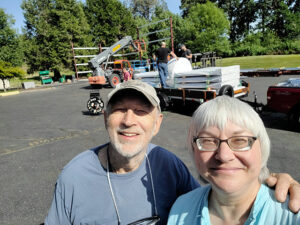
Coming together with others in wholesome purpose and sharing the best of ourselves, is a balm for a deeply troubled world. The cultivated qualities we share deepen our faith in the Buddha’s teachings and in one another, at a time when we most need it. Reviewing Cloud Mountain’s 40 years of dharma service and evolution as a retreat center, its firmest ground has been and will continue to be how we as a sangha inspire and support one another to keep the dharma and the goodness that arises from it alive, vibrant, relevant, and flowing to benefit ourselves and all beings.
Laura Hauer has worked at Cloud Mountain for over 30 years in every staff position. She has been executive director for the last 12 years. Her main practice is dana through service.
